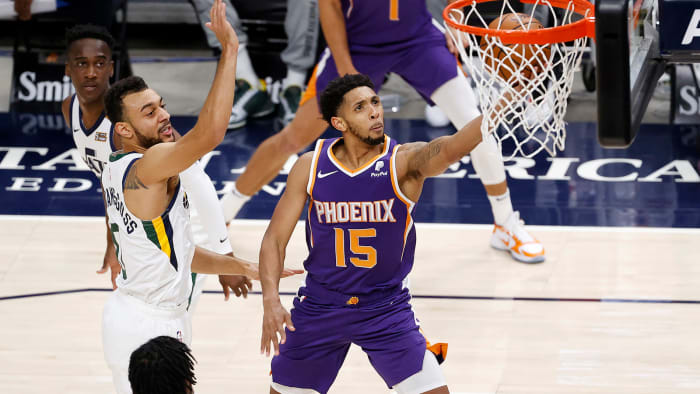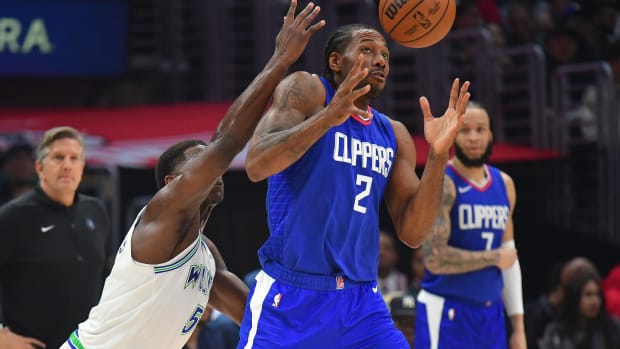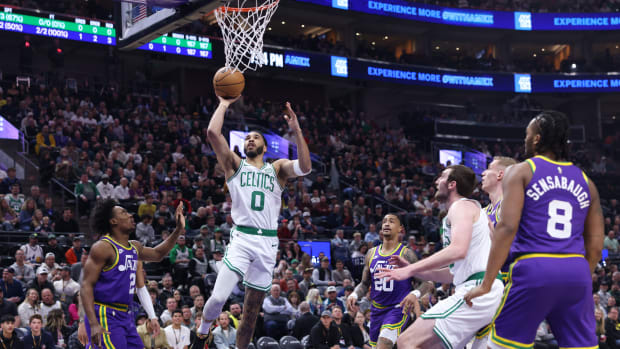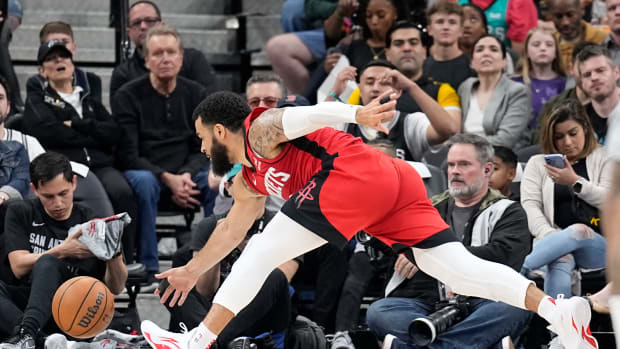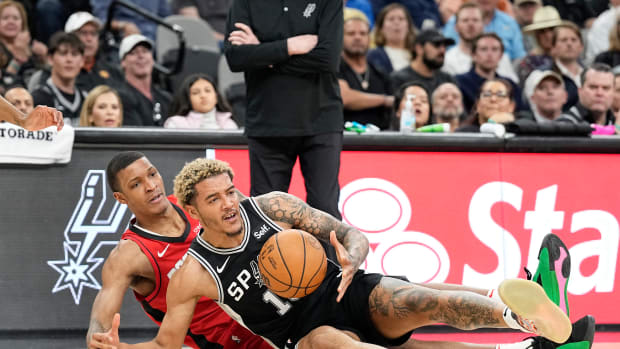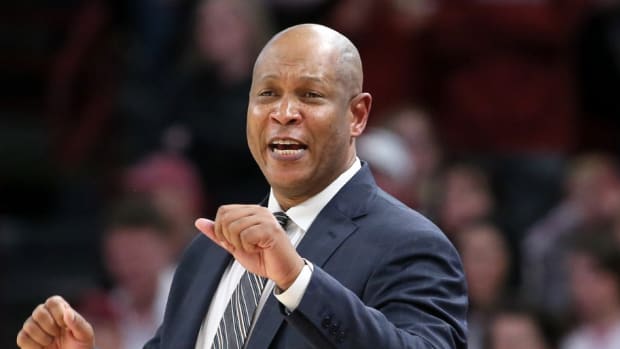Cam Payne's Career Is Back From the Dead
Welcome to the Morning Shootaround, where every weekday you’ll get a fresh, topical column from one of SI.com’s NBA writers: Howard Beck on Mondays, Chris Mannix on Tuesdays, Michael Pina on Wednesdays, Chris Herring on Thursdays and Rohan Nadkarni on Fridays.
We all know the NBA season was hanging in the balance about a year ago. But even before the league’s coronavirus-related stoppage, Cam Payne’s NBA career seemed to be hanging by the flimsiest of threads, too.
By the summer of 2020, it had been almost a year and a half since the point guard had played in an NBA game. His last stop had been a January '19 stint with the Cavaliers, where he was let go after a pair of 10-day deals. Leading up to that point, between foot injuries and poor, inconsistent play, the former first-rounder had been an inefficient disappointment, washing out with both the Thunder and the Bulls.
Then, with the light getting dimmer after 17 months on the NBA sidelines, the Suns came calling.
Phoenix turned out to be a huge surprise down in Orlando, going a perfect 8–0 while narrowly missing the playoffs. And Payne, picked up just before the team headed east for the bubble, was arguably an even bigger revelation. A career 39.7% shooter who’d logged six points per game to that point, Payne averaged 10.9 points, connected on 48.5% of his shots during the eight-game run, including 51.7% from three.
And since that breakout showing, the 26-year-old has become a key piece with the title-contending Suns.
While Payne hasn’t been quite as on fire as he was in Orlando, at 47.5% overall and 42.5% from deep with just three regular-season games left to play, he isn’t terribly far off from those metrics. He had the best showing of his career on Sunday night, dropping 24 points on 9-of-10 from the floor against the Lakers. And Payne has logged double-digit point totals in five of his last eight games. The double-digit outputs tend to be a great thing for Phoenix, which has gone 17–2 in contests where Payne has 10 points or more.
It’s a wild, stark turnaround from where things were just a year ago when there were a number of signs that Payne’s NBA career might be over. After averaging 24 points in the G League just before COVID-19 shut things down, he got word from the Mavericks that they were going to sign Trey Burke instead of him.
When that fell through, Payne told himself, “That’s gonna be it for me,” according to ESPN’s Zach Lowe.
His assumption was a fair one. Through Payne’s first four seasons, he’d posted an effective field-goal rate of just 46.5%—one that was among the 20 worst marks in the association over that span. That put the guard in the same bucket with a handful of older players who’ve since retired and several younger ones who’ve found themselves at a career crossroads because of how badly they’ve struggled thus far.
Payne experienced something of a basketball wilderness in late 2019 when he signed on to play in China. Upon landing in Hong Kong, Payne and his girlfriend ended up having to drag their six bags for what felt like miles to the hotel after no one from his team, Shanxi Loongs, came to pick them up after the flight. And once they made it to the hotel, the room was so small to where they couldn’t even fit all their bags.
“That was the first thing where I was like, ‘This ain’t the NBA,' ” Payne said.
In a way, that overseas excursion served as a sort of Ebenezer Scrooge moment for him. If his NBA career was all but dead, this was a clear-eyed Payne looking at what would take its place. Walking for miles in a foreign land as opposed to having a car service. Hotel rooms the size of a small closet. No fame. No glory.
Fortunately for him, Suns coach Monty Williams served as Payne’s Ghost of Christmas Yet to Come. As an assistant coach, Williams had worked with the floor general back at his first stop, in Oklahoma City.
“He’s always been a good kid, but he [eventually] learned how to work. He learned to be consistent in the work,” Williams said. “I’m not as surprised as everybody else is, because I had him. And Sam Presti doesn’t make a lot of mistakes. … I think if you talked to Cam, he’d probably tell you more than I could. But he just got serious about the work. He always worked, but then he got more consistent about it.”
Williams had suggested to Payne, during the stint with the Thunder, that he put in longer hours at the practice facility. But that advice, lost on him the first time, finally resonated with him in Phoenix.
Similarly, where Payne once looked a bit out of place in an NBA rotation, he now often looks fantastic and completely comfortable. The Suns’ lineups, which sometimes have him sharing the court with fellow point guard Jevon Carter, don’t put an inordinate amount of pressure on Payne. He cares for the ball well—six assists and no turnovers on Tuesday—and owns a pristine 3.5-to-1 assist-to-turnover ratio.
Even when he was struggling, Payne had always been a decent pick-and-roll ballhandler. Yet the lefty’s found a new level with the Suns, both in those sets and as a jump-shooter. He ranks in the 93rd percentile in catch-and-shoot situations, according to Synergy—something that makes him a quietly dangerous option when playing alongside stars like Chris Paul and Devin Booker. He’s shot 57.1% from the floor with Paul and 51% with Booker, both higher than his 40.5% mark when neither is on the court with him. However you slice the numbers, it’s impossible to overlook one in particular: Phoenix beats opponents by eight points per 100 possessions with Payne, up from a cushion of just 4.8 points per 100 plays without him, according to Stats Perform.
Payne, who will be a free agent this offseason, finds himself in a highly unusual spot. In just 18 months, he’s gone from being a near-washout to a key contributor to a club that has its sights on a title. “It’s starting to come naturally for him now, and I think it’s helped him to be in a situation where there’s purposeful, meaningful basketball,” said Jae Crowder, adding that Payne’s increased effort has been apparent all year.
Fitting for someone who had an 11th-hour, Scrooge-like epiphany, where his NBA life flashed before his eyes.
More NBA Coverage:
• Pina: 2021 NBA All-League Pass Team
• Woo: 10 Parting Thoughts on the NBA Rookie Class
• Beck: The Kings Are Building for the Future
• Pina: Dejounte Murray's Rise






























